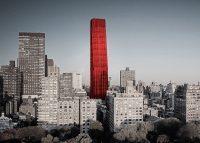New York politicians angry at the city’s decision to support a controversial Upper West Side tower say the position is “shocking” and “defies reason.”
In a statement Thursday, state legislators Linda Rosenthal and Brad Hoylman and others condemned the city’s decision to side with SJP Properties and Mitsui Fudosan America in appealing a court ruling that revoked the permit for 200 Amsterdam Avenue.
The appeal, filed Tuesday, came one day after the Department of Buildings clarified that zoning lots can no longer be comprised of partial zoning lots, as was allowed with the 668-foot condominium tower, which is nearly complete.
The de Blasio administration now finds itself in the unusual position of defending a permitting decision that its new policy would prohibit.
“The city’s appeal is not in line with its own actions and statements regarding the question of gerrymandered zoning lots,” the politicians said. “It defies reason for the administration to fight a court order which affirms its own correction of its initially flawed process.”
But it makes perfect sense to city officials, who say agencies, not judges, should set city policy and decide permit applications. “It is the city’s responsibility to fix flawed policy — not the court’s — and we must appeal this decision because of its far reaching implications for how policy is shaped,” City Hall spokesperson Jane Meyer told Politico.
The developers have defended the original permit.
“To retroactively apply a never adopted proposed new rule on a legally constructed building would have been incredibly unfair and would have violated the owner’s legal rights,” a spokesperson for SJP Properties and Mitsui Fudosan America said in a statement.
Read more




The legal back-and-forth over 200 Amsterdam Avenue has been playing out for years, dating back to the original challenge in 2017. The appeals process will likely take months to resolve.
In an interview with The Real Deal Friday, Rosenthal said she was confident the court made the right decision and the ruling would be upheld.
“I have spoken to many of my constituents in the area and they are appalled, and there is a lot of support for maintaining what Justice Perry ordered,” she said.
“My hope is that [the decision] is very far-reaching in that developers will stop trying to get around the zoning code and the law by coming up with clever workarounds,” she added.
In the meantime, construction is continuing at the 52-story residential tower, which faces deconstruction of up to 20 floors if the state court’s ruling is upheld.
The politicians argued in their statement — which was also signed by Rep. Jerrold Nadler, City Comptroller Scott Stringer, Manhattan Borough President Gale Brewer, Council member Helen Rosenthal and Assembly member Richard Gottfried — that the developers were aware of the risks and “persisted in building additional stories which they knew were potentially illegal.”
The developers acknowledged knowing the risks — the dispute is detailed in the building’s offering plan — but argued they had strong grounds to believe the permit would be upheld. In an earlier interview, Kramer Levin attorney Paul Selver pointed to decisions by the Department of Buildings and the Board of Standards and Appeals in support of the permit, and noted the court did not halt construction at an earlier stage.
One of the main issues is the merit of the permit itself. There’s also the question of whether the buildings department’s new position about zoning lots, which first appeared in a 2018 draft bulletin, could be applied retroactively.
“Even if the determination was that the zoning lot was improper, there was so much history to the interpretation that we were relying on that the decision would not be retroactive,” Selver said.
Unconvinced, the politicians are hoping for a course correction.
“We urge the administration to reverse their decision,” they wrote.
The de Blasio administration has changed its mind on development lawsuits before: In 2015 it initially declined to contest an Appellate Division ruling against a Willets Point project, leaving developers Sterling Equities and the Related Companies to petition the Court of Appeals on their own. But after the high court agreed to hear the case, the administration rejoined the case, citing the developers’ agreement to include affordable housing in their project.
The tower at 200 Amsterdam Avenue, however, is to include only market-rate apartments.
Write to Sylvia Varnham O’Regan at so@therealdeal.com
